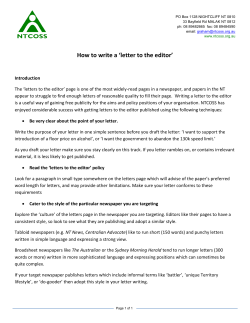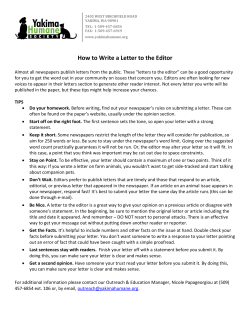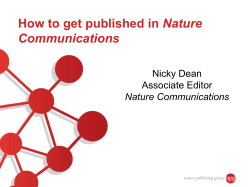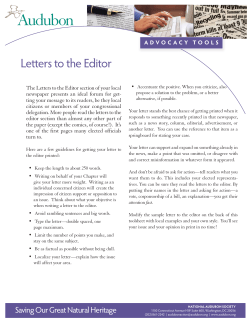
Guidelines for the Use of Editorial Assistance in Assessment Writing
Guidelines for the Use of Editorial Assistance in Assessment Writing These guidelines are intended to inform Alphacrucis College (AC) staff and students about the extent, and the nature, of editorial assistance that may be given in the writing of assessments. While the use of editorial assistance is permitted, the level of assistance must not extend beyond what is permitted under these guidelines. These guidelines are based on the Australian Standards for Editing Practice, available at http://ipededitors.org/About_editing/Editing_standards.aspx. This document has five standards covering the following topics: Standard A. Professional practice. This relates to an editor’s understanding of the stages of the publication process and the standard practices of the publishing industry. Standard B. Management and liaison. This relates to the editor’s management of their own time and resources, and the skills required to manage an editorial project. Standard C. Substance and structure. This relates to an editor ensuring that the form, arrangement, focus and length of a document are suitable for its purpose. Standard D. Language and illustrations. This relates to an editor’s role in ensuring appropriate clarity of expression, voice and tone, grammar and usage, spelling and punctuation, and illustrations. Standard E. Completeness and consistency. This relates to an editor’s role in ensuring elements of a document are complete, consistent and correctly placed. Application of the Standards at AC: 1. Standards A and B relate to the publication of works and are therefore not usually relevant to the writing of assessments for AC. 2. Where an editor provides advice on matters of structure (Standard C), exemplars only should be given. The editor should not restructure or reorder any part of the assessment on the student’s behalf. Application: If an editor feels that the overall structure (including form, arrangement, focus and length) of an assessment requires work, they should not do this on behalf of the student. The editor can make suggestions using example work that is well structured. 3. Generally, editorial intervention should be restricted to Standard D and Standard E. Application: Editors can provide comments and suggested corrections on clarity of expression, voice and tone, grammar, spelling and punctuation, and the formatting of assessments (related to consistency). It is important that the editorial process is a learning experience for the student and may be regarded as part of their education. Consequently, editorial assistance should be rendered on a hard copy of the assessment - in electronic format it is too easy for the student to accept editorial suggestions without thinking about their implications.
© Copyright 2025





















